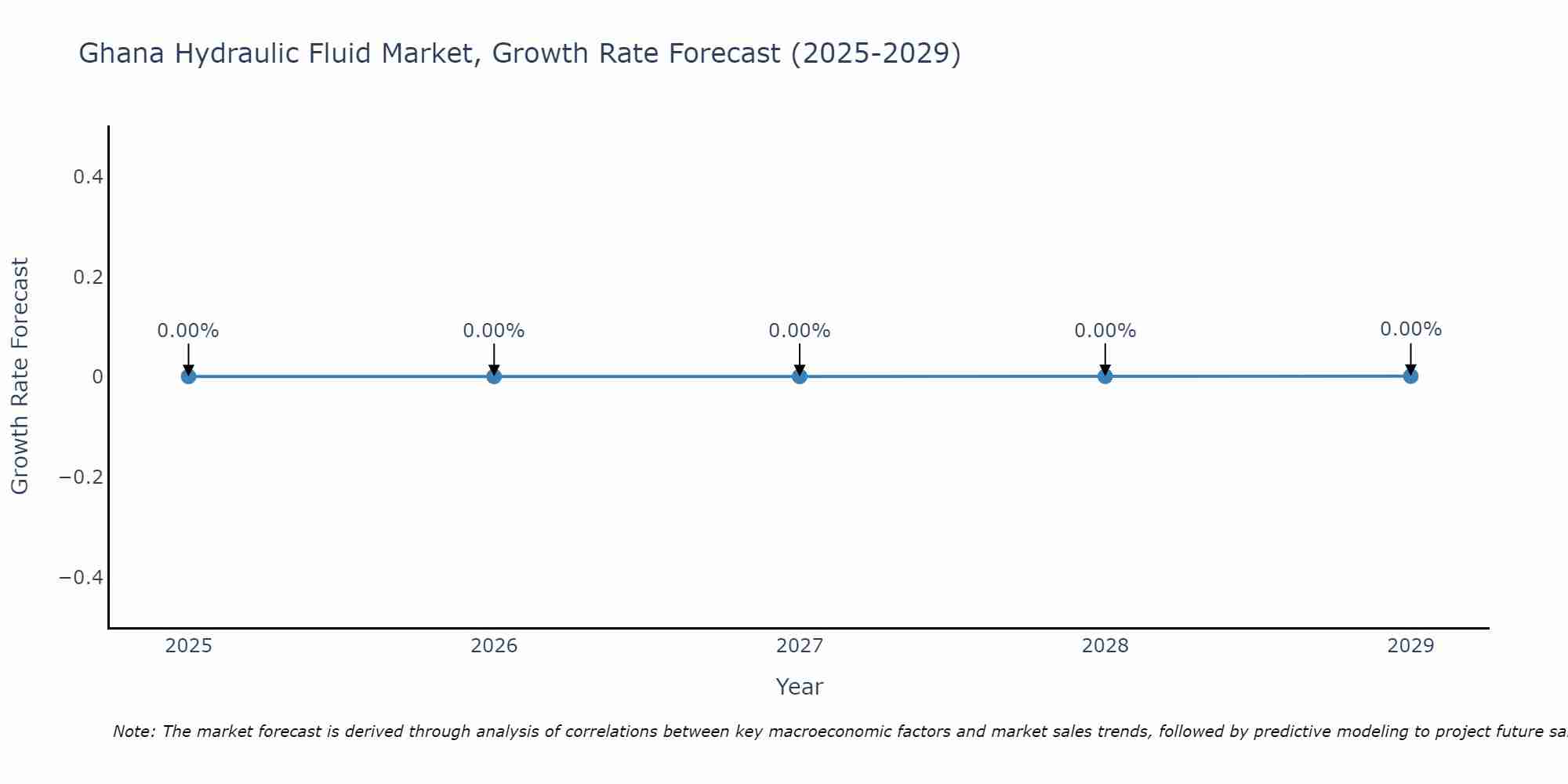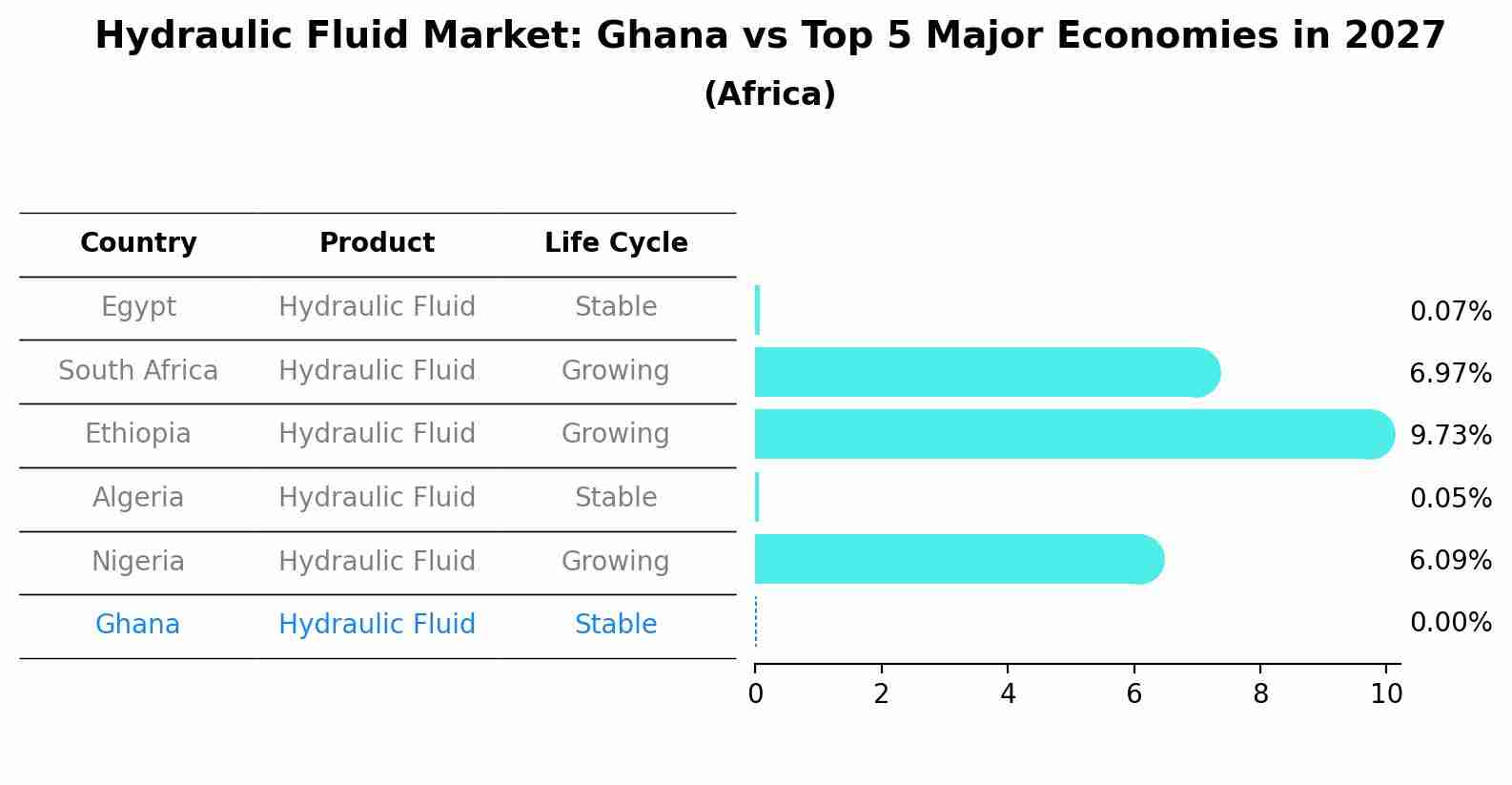Ghana Hydraulic Fluid Market (2025-2031) Outlook | Value, Analysis, Share, Industry, Revenue, Growth, Trends, Companies, Forecast & Size
| Product Code: ETC365156 | Publication Date: Aug 2022 | Updated Date: Aug 2025 | Product Type: Market Research Report | |
| Publisher: 6Wresearch | Author: Sachin Kumar Rai | No. of Pages: 75 | No. of Figures: 35 | No. of Tables: 20 |
Ghana Hydraulic Fluid Market Size Growth Rate
The Ghana Hydraulic Fluid Market is likely to experience consistent growth rate gains over the period 2025 to 2029. Commencing at 0.00% in 2025, growth builds up to 0.00% by 2029.

Hydraulic Fluid Market: Ghana vs Top 5 Major Economies in 2027 (Africa)
In the Africa region, the Hydraulic Fluid market in Ghana is projected to expand at a stable growth rate of 0.00% by 2027. The largest economy is Egypt, followed by South Africa, Ethiopia, Algeria and Nigeria.

Ghana Hydraulic Fluid Market Synopsis
The Ghana Hydraulic Fluid Market is experiencing steady growth driven by increasing industrial activities and infrastructure development in sectors such as mining, construction, and agriculture. The market is primarily dominated by mineral-based hydraulic fluids due to their cost-effectiveness and wide availability. However, there is a growing trend towards the adoption of synthetic and bio-based hydraulic fluids due to their superior performance characteristics and environmental sustainability. Key players in the market are focusing on product innovation, such as developing fluids with enhanced wear protection and thermal stability, to cater to the evolving needs of customers. Additionally, stringent regulations related to environmental protection are encouraging the shift towards eco-friendly hydraulic fluid solutions in Ghana.
Ghana Hydraulic Fluid Market Trends
The Ghana Hydraulic Fluid Market is experiencing a shift towards environmentally friendly and biodegradable hydraulic fluids due to increasing environmental concerns and regulations. Companies are focusing on developing sustainable hydraulic fluid solutions that reduce the impact on the environment while maintaining high performance levels. Additionally, there is a growing demand for synthetic and high-performance hydraulic fluids to improve equipment efficiency and longevity. The market is also witnessing a trend towards the adoption of advanced hydraulic fluid technologies such as fire-resistant fluids for applications in industries with high fire risk. Overall, the Ghana Hydraulic Fluid Market is moving towards sustainable and innovative solutions to meet the evolving needs of the industry while minimizing environmental impact.
Ghana Hydraulic Fluid Market Challenges
In the Ghana Hydraulic Fluid Market, some key challenges include limited awareness and understanding of the benefits of using hydraulic fluids among potential customers, leading to slow adoption rates. Additionally, the market faces issues related to the availability and quality of locally produced hydraulic fluids, which can impact overall product performance and reliability. Infrastructure constraints and inconsistent supply chain logistics also present hurdles, affecting the distribution and accessibility of hydraulic fluids across the country. Moreover, price fluctuations and competitive pressures from imported products further complicate the market dynamics, making it challenging for local manufacturers and distributors to maintain market share and profitability. Addressing these challenges will require improved education and marketing efforts, investments in quality control measures, infrastructure development, and strategic pricing strategies to enhance competitiveness and drive growth in the Ghana Hydraulic Fluid Market.
Ghana Hydraulic Fluid Market Investment Opportunities
The Ghana Hydraulic Fluid Market presents promising investment opportunities due to the country`s growing industrial sector, particularly in mining, agriculture, and manufacturing. With the increasing demand for hydraulic machinery in these industries, there is a rising need for high-quality hydraulic fluids to ensure optimal performance and efficiency. Investors can capitalize on this by supplying a diverse range of hydraulic fluids tailored to meet the specific requirements of different industries. Additionally, the market offers potential for growth through the introduction of eco-friendly and bio-based hydraulic fluids to align with the country`s sustainability goals. By staying attuned to industry trends, technological advancements, and customer preferences, investors can position themselves strategically in the Ghana Hydraulic Fluid Market to generate significant returns on their investments.
Jordan Agar Market Government Policies
The government of Ghana has implemented various policies to regulate the hydraulic fluid market in the country. These policies include the Ghana Standards Authority (GSA) ensuring that all hydraulic fluids meet specified quality standards to protect consumers and the environment. Additionally, the Environmental Protection Agency (EPA) enforces regulations to minimize pollution from the disposal of hydraulic fluids. The government also provides incentives and support for local production of hydraulic fluids to promote self-sufficiency and reduce reliance on imports. Overall, these policies aim to ensure the availability of high-quality hydraulic fluids in the market while promoting sustainable practices and economic growth in Ghana.
Ghana Hydraulic Fluid Market Future Outlook
The Ghana Hydraulic Fluid Market is poised for significant growth in the coming years, driven by expanding industrial activities, especially in the mining, construction, and agriculture sectors. The increasing adoption of hydraulic systems in various applications due to their efficiency and durability is expected to fuel the demand for hydraulic fluids in the country. Additionally, the government`s focus on infrastructure development and the rising investments in key sectors are likely to further boost the market. With the growing awareness among end-users about the importance of proper maintenance and lubrication for equipment longevity, the demand for high-quality hydraulic fluids is anticipated to rise steadily. However, market players will need to navigate challenges such as price volatility of raw materials and environmental regulations to capitalize on the opportunities presented by the growing market.
Key Highlights of the Report:
- Ghana Hydraulic Fluid Market Outlook
- Market Size of Ghana Hydraulic Fluid Market, 2024
- Forecast of Ghana Hydraulic Fluid Market, 2031
- Historical Data and Forecast of Ghana Hydraulic Fluid Revenues & Volume for the Period 2021 - 2031
- Ghana Hydraulic Fluid Market Trend Evolution
- Ghana Hydraulic Fluid Market Drivers and Challenges
- Ghana Hydraulic Fluid Price Trends
- Ghana Hydraulic Fluid Porter's Five Forces
- Ghana Hydraulic Fluid Industry Life Cycle
- Historical Data and Forecast of Ghana Hydraulic Fluid Market Revenues & Volume By Base Oil for the Period 2021 - 2031
- Historical Data and Forecast of Ghana Hydraulic Fluid Market Revenues & Volume By Synthetic Oil for the Period 2021 - 2031
- Historical Data and Forecast of Ghana Hydraulic Fluid Market Revenues & Volume By Mineral Oil for the Period 2021 - 2031
- Historical Data and Forecast of Ghana Hydraulic Fluid Market Revenues & Volume By Bio-based Oil for the Period 2021 - 2031
- Historical Data and Forecast of Ghana Hydraulic Fluid Market Revenues & Volume By End Use for the Period 2021 - 2031
- Historical Data and Forecast of Ghana Hydraulic Fluid Market Revenues & Volume By Oil & Gas for the Period 2021 - 2031
- Historical Data and Forecast of Ghana Hydraulic Fluid Market Revenues & Volume By Marine for the Period 2021 - 2031
- Historical Data and Forecast of Ghana Hydraulic Fluid Market Revenues & Volume By Automotive for the Period 2021 - 2031
- Historical Data and Forecast of Ghana Hydraulic Fluid Market Revenues & Volume By Aerospace & defense for the Period 2021 - 2031
- Historical Data and Forecast of Ghana Hydraulic Fluid Market Revenues & Volume By Construction for the Period 2021 - 2031
- Historical Data and Forecast of Ghana Hydraulic Fluid Market Revenues & Volume By Others for the Period 2021 - 2031
- Ghana Hydraulic Fluid Import Export Trade Statistics
- Market Opportunity Assessment By Base Oil
- Market Opportunity Assessment By End Use
- Ghana Hydraulic Fluid Top Companies Market Share
- Ghana Hydraulic Fluid Competitive Benchmarking By Technical and Operational Parameters
- Ghana Hydraulic Fluid Company Profiles
- Ghana Hydraulic Fluid Key Strategic Recommendations
Frequently Asked Questions About the Market Study (FAQs):
- Single User License$ 1,995
- Department License$ 2,400
- Site License$ 3,120
- Global License$ 3,795
Search
Related Reports
- Australia IT Asset Disposal Market (2025-2031) | Strategy, Consumer Insights, Analysis, Investment Trends, Opportunities, Growth, Size, Share, Industry, Revenue, Segments, Value, Segmentation, Supply, Forecast, Restraints, Outlook, Competition, Drivers, Trends, Demand, Pricing Analysis, Competitive, Strategic Insights, Companies, Challenges
- UAE Building Thermal Insulation Market Outlook (2025-2031) | Revenue, Companies, Share, Trends, Growth, Size, Forecast, Industry, Analysis & Value
- Portugal Electronic Document Management Market (2025-2031) | Strategy, Consumer Insights, Analysis, Investment Trends, Opportunities, Growth, Size, Share, Industry, Revenue, Segments, Value, Segmentation, Supply, Forecast, Restraints, Outlook, Competition, Drivers, Trends, Demand, Pricing Analysis, Competitive, Strategic Insights, Companies, Challenges
- France Electronic Document Management Market (2025-2031) | Strategy, Consumer Insights, Analysis, Investment Trends, Opportunities, Growth, Size, Share, Industry, Revenue, Segments, Value, Segmentation, Supply, Forecast, Restraints, Outlook, Competition, Drivers, Trends, Demand, Pricing Analysis, Competitive, Strategic Insights, Companies, Challenges
- Portugal Occupational Health & Safety Services Market (2025-2031) | Strategy, Consumer Insights, Analysis, Investment Trends, Opportunities, Growth, Size, Share, Industry, Revenue, Segments, Value, Segmentation, Supply, Forecast, Restraints, Outlook, Competition, Drivers, Trends, Demand, Pricing Analysis, Competitive, Strategic Insights, Companies, Challenges
- Netherlands Occupational Health and Safety Services Market (2025-2031) | Strategy, Consumer Insights, Analysis, Investment Trends, Opportunities, Growth, Size, Share, Industry, Revenue, Segments, Value, Segmentation, Supply, Forecast, Restraints, Outlook, Competition, Drivers, Trends, Demand, Pricing Analysis, Competitive, Strategic Insights, Companies, Challenges
- Belgium and Luxembourg Facility Management Market (2025-2031) | Strategy, Consumer Insights, Analysis, Investment Trends, Opportunities, Growth, Size, Share, Industry, Revenue, Segments, Value, Segmentation, Supply, Forecast, Restraints, Outlook, Competition, Drivers, Trends, Demand, Pricing Analysis, Competitive, Strategic Insights, Companies, Challenges
- Russia Women Intimate Apparel Market (2025-2031) | Strategy, Consumer Insights, Analysis, Investment Trends, Opportunities, Growth, Size, Share, Industry, Revenue, Segments, Value, Segmentation, Supply, Forecast, Restraints, Outlook, Competition, Drivers, Trends, Demand, Pricing Analysis, Competitive, Strategic Insights, Companies, Challenges
- Africa Chocolate Market (2025-2031) | Size, Share, Trends, Growth, Revenue, Analysis, Forecast, industry & Outlook
- Global Hydroxychloroquine And Chloroquine Market (2025-2031) | Industry, Trends, Size, Outlook, Growth, Value, Companies, Revenue, Analysis, Share, Forecast
Industry Events and Analyst Meet
Our Clients
Whitepaper
- Middle East & Africa Commercial Security Market Click here to view more.
- Middle East & Africa Fire Safety Systems & Equipment Market Click here to view more.
- GCC Drone Market Click here to view more.
- Middle East Lighting Fixture Market Click here to view more.
- GCC Physical & Perimeter Security Market Click here to view more.
6WResearch In News
- Doha a strategic location for EV manufacturing hub: IPA Qatar
- Demand for luxury TVs surging in the GCC, says Samsung
- Empowering Growth: The Thriving Journey of Bangladesh’s Cable Industry
- Demand for luxury TVs surging in the GCC, says Samsung
- Video call with a traditional healer? Once unthinkable, it’s now common in South Africa
- Intelligent Buildings To Smooth GCC’s Path To Net Zero













